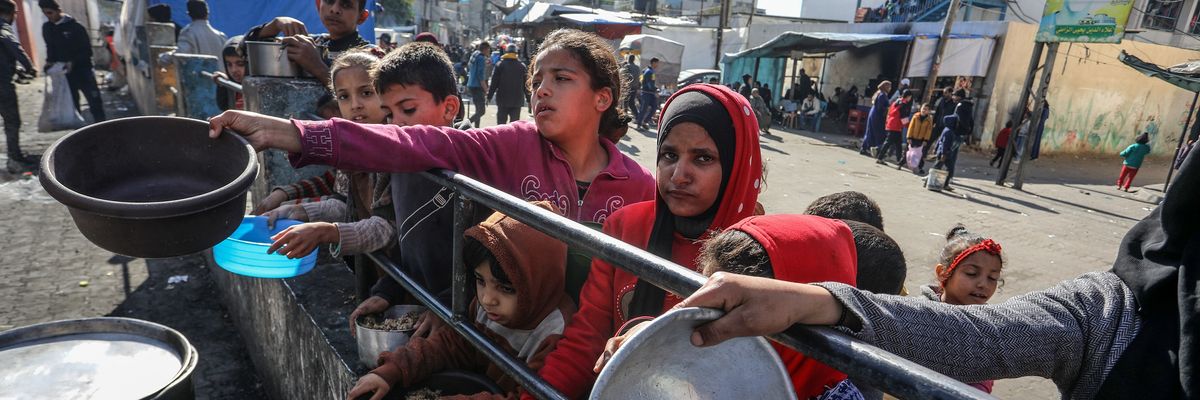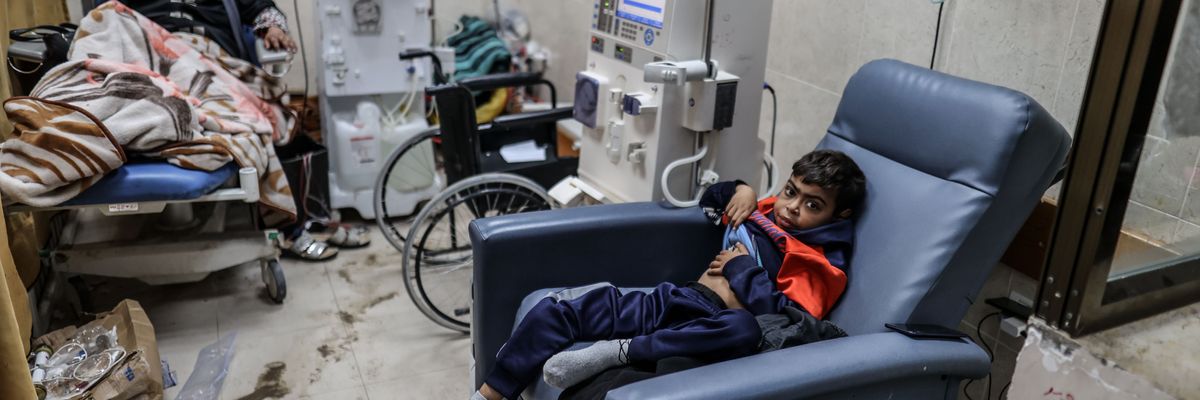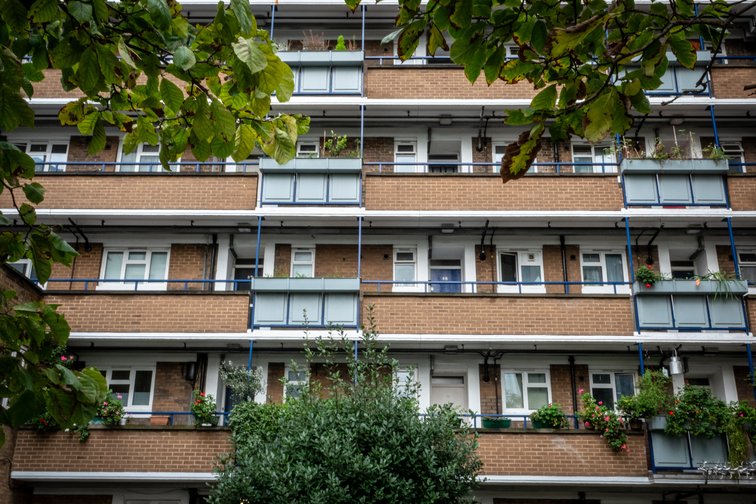Israeli Plan to Evacuate Rafah by Force Sparks Warnings of ‘Ethnic Cleansing’
Original article by Jake Johnson republished from Common Dreams under Creative Commons (CC BY-NC-ND 3.0).

One Palestinian human rights group called Israel’s evacuation orders “a pretext to push Gaza’s population closer to the border with Egypt in preparation for their mass deportation.”
Israeli Prime Minister Benjamin Netanyahu on Friday ordered the Israel Defense Forces to craft a plan to “evacuate” the population of Rafah, a small city near Gaza’s border with Egypt that’s packed with at least 1.4 million people—most of whom fled there to escape Israeli bombs and troops.
Human rights advocates immediately sounded alarm, stressing that the forcible transfer of civilians is a crime against humanity and that there’s nowhere safe for Gazans to flee as Israeli forces bomb the area and snipers fire on civilians in Khan Younis, a city to Rafah’s north.
“Make no mistake—the entirety of Gaza is a ‘combat zone,'” Frankie Leach, head of media at ActionAid U.K., wrote Friday.
Kenneth Roth, former executive director of Human Rights Watch, was among those asking where the 1.4 million people currently in Rafah are supposed to move.
“Does he plan a mass deportation to Egypt (a blatant war crime)?” Roth wrote on social media.
The Al Mezan Center for Human Rights, a Palestinian organization, called Israel’s evacuation orders “a pretext to push Gaza’s population closer to the border with Egypt in preparation for their mass deportation.”
“Time is running out: The international community must act now to halt the ground invasion of Rafah,” the group added.
Humanitarian aid organizations and United Nations officials have been bracing for an Israeli invasion of Rafah for weeks, warning that any large-scale attack on the densely populated city would be a grave violation of international law.
“A full-scale military operation in Rafah would have devastating consequences for civilians in Gaza who have endured more than four months of trauma, extreme hunger, lack of water, disease, and extremely limited medical resources due to the conflict and siege of the enclave,” CARE International said Friday. “Such an escalation would also bring existing humanitarian operations to a standstill, impacting all of Gaza. The limited aid that is currently able to trickle into the enclave does so from Rafah, and most humanitarian organizations currently operate from there.”
U.N. Secretary-General António Guterres said late Thursday that an Israeli ground assault on Rafah “would exponentially increase what is already a humanitarian nightmare with untold regional consequences.”
“The only thing that will stop this situation spinning even further out of control is an immediate and permanent cease-fire.”
Netanyahu’s office claimed in a statement Friday that “it is impossible to achieve the war objective of eliminating Hamas and leaving four Hamas battalions in Rafah.”
“On the other hand, it is clear that a massive operation in Rafah requires the evacuation of the civilian population from the combat zones,” the statement continued. “That is why the prime minister directed the IDF and the defense establishment to bring to the cabinet a dual plan for both the evacuation of the population and the disbanding of the battalions.”
Yousef Munayyer, a Palestinian American political analyst, wrote in response that “the Israeli PM is ordering ethnic cleansing of the Palestinian refugees amassed in Rafah.”
During the first week of its latest assault on the Gaza Strip, Israel instructed the entire population of northern Gaza—roughly 1.1 million people—to evacuate to the south, then proceeded to bomb evacuation routes and supposed “safe zones.”
Now Israel’s military is preparing to move on the enclave’s last-remaining refuge for displaced people. In recent days, Israeli forces have ramped up airstrikes on the Rafah, destroying houses and killing civilians—including children.
Overcrowding in Rafah, a city that’s about a quarter the size of Baltimore, has become so severe that many people are sleeping on the streets and outside of hospitals in makeshift tents. Hundreds of people have been forced to share a single toilet, and many are starving.
“Now, they may be forced to flee once more as Israeli forces prepare to invade the area. A military assault on the city would lead to thousands of new civilian deaths and injuries,” Medical Aid for Palestinians (MAP) said in a statement Friday. “Urgent action must be taken now if this new crisis in Rafah is to be averted. World leaders need to use all tools at their disposal to demand an immediate and permanent cease-fire, and protection for civilians in Gaza. We reiterate our continuous warnings about the very real prospect of mass displacement of Palestinians into Egypt.”
Rohan Talbot, director of advocacy and campaigns at MAP, wrote in response to Netanyahu’s order that “we’ve warned of this since week one.”
“This is what impunity gets you,” Talbot added.
The U.S., Israel’s top ally and arms supplier, has said it would oppose an Israeli military incursion into Rafah unless adequate steps were taken to protect civilians.
But aid groups warned that it’s impossible to protect civilians without an immediate end to Israel’s bombing and ground assault.
“Where on earth is Gaza’s exhausted and starving population supposed to go?” asked Riham Jafari, advocacy and communications coordinator at ActionAid Palestine, in a statement on Friday. “People are now so desperate that they’re eating grass in a last attempt to stave off hunger. Meanwhile, infections and diseases are running rampant amid such overcrowded conditions.”
“The only thing that will stop this situation spinning even further out of control,” Jafari added, “is an immediate and permanent ceasefire—it’s the only way to stop more lives being lost and to allow enough lifesaving aid to enter the territory.”
Original article by Jake Johnson republished from Common Dreams under Creative Commons (CC BY-NC-ND 3.0).



